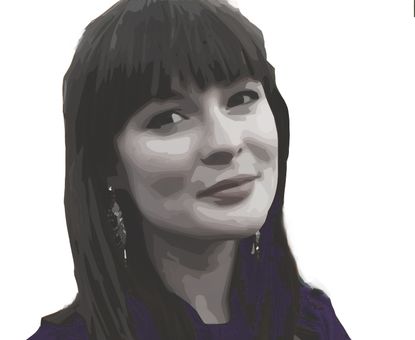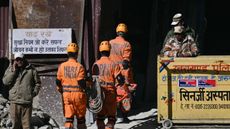Anti-Semitism on the rise: not just sickening but misguided
'Our problem is not with the Jews,' said the Palestinian refugee, 'but with the Israeli government and army'

How sickening that anti-Semitism is rearing its ugly head once more. Regardless of political affiliations or beliefs, blaming a whole race or religion for the actions of a few is reprehensible.
And yet, under the heinous pretence of supporting the Palestinian cause and those dying in Gaza, anti-Semitism appears to be crawling out from the under the rock where it belongs.
The fighting has even led to anti-Semitism being vocalised within Israel, with chants of 'Death to the Arabs' and 'I hate all the Arabs' heard across the country. Yes - Arabs, like dozens of other Middle Eastern peoples who speak languages that share their roots with Hebrew, are Semites too.
Subscribe to The Week
Escape your echo chamber. Get the facts behind the news, plus analysis from multiple perspectives.

Sign up for The Week's Free Newsletters
From our morning news briefing to a weekly Good News Newsletter, get the best of The Week delivered directly to your inbox.
From our morning news briefing to a weekly Good News Newsletter, get the best of The Week delivered directly to your inbox.
But while the recent outbursts of what should more accurately be called anti-Arabism in Israel can be seen within the context of a country that treats Palestinians as second-class citizens and is led by a hawkish, right-wing government, the same cannot be said of the anti-Semitic incidents across Europe.
Despite the presence of respected, well-integrated Jewish communities that enjoy full civil rights and are bolstered by governments that unequivocally condemn acts of anti-Semitism - or more accurately, anti-Judaism - the hate crimes do not seem to be slowing up.
In France, there was a rampage of looting and vandalism targeting Jewish-owned businesses and a synagogue. 'Gas the Jews' was even heard being chanted. In Britain, the last month has seen the number of reported crimes against British Jews double. In Germany, slogans such as 'Death to Jews' have made an appearance at Palestinian solidarity demonstrations.
All of this has been precipitated by Israel’s three-week-old military operation in Gaza, where it has killed more than 1,300 people and bombed hospitals, schools and other vital civilian infrastructure.
Yet to say any of this justifies or invites attacks on Jews is not only grossly offensive but totally misses the point. This flare in anti-Judaism is about the wilful blurring of the very clear distinction between Jew and Israeli and the appalling consequences that come with such ambiguity.
The need to separate the two when discussing the Israeli-Palestinian conflict was first pointed out to me by a refugee in Bethlehem. It was my first time in the Middle East and I was staying in the West Bank’s Aida Refugee Camp, a small, cramped plot of land surrounded on three sides by the towering concrete of the Separation Wall.
Before the wall was erected, one of the residents told me, children had played football with their Jewish neighbours in the olive groves. He pointed to a large stretch of cultivated land now on the Israeli side of the wall. You must remember our problem is not with the Jews, he continued, but with the Israeli government and their army.
It was a sentence that, in one form or another, I heard often during that trip, but unfortunately, less and less during my time in the Middle East since.
To be sure, there are still educated or well-travelled people in the region who make the distinction, and are aware of the millions of Jews across the world who either feel Israel has nothing to do with them or else support Israel but actively condemn the occupation and everything that comes with it.
But for most on the Arab street, the difference between Israeli and Jew is not so clear. What few Jews there are in the Arab world - the last remnants of ancient communities - live secretly for fear of becoming scapegoats for Israel's deeds.
The ongoing occupation of the Palestinian territories, the 18-year occupation of southern Lebanon, the 2006 war with Lebanon, the numerous wars with Gaza - all of this has contributed to making "Yehud" (Jew in Arabic) a dirty word despite centuries of peaceful co-existence across the region.
Part of the fusing of Jews and Israelis into one entity is a result of ignorance and/or genuine anti-Judaism propaganda from extremist quarters. But part of it is also Israel’s doing.
“The state of Israel provides full equal rights, individual rights, to all its citizens, but it is the nation state of one people only – the Jewish people – and of no other people,” Prime Minister Benjamin Netanyahu said earlier this year.
Quite aside from the fact that this ignores the historic presence of numerous other religions in the Holy Land, it also inextricably links all Jewish people with Israel. The persistent use of the controversial term 'Jewish state' as interchangeable with Israel serves to reinforce this connection.
The piece de resistance is the nonsensical accusation that those who criticise Israel are automatically guilty of anti-Judaism. The idea that to support Judaism is to support all aspects of the Israeli government has gone so far that Jewish people who break this rule are described by some as self-hating Jews.
If Israel is determined to keep on going along the path it has begun, then it should at least admit that it does not represent all Jews. One can condemn Israel’s actions and not be anti-Judaism or anti-Semitic.
At a time when horrific extremist Islamist sentiment is on the rise in the region, it is a dangerous line to blur. The black Islamic flag adopted by the Islamic State of Iraq and Greater Syria (Isis) popped up last week at a protest in the Netherlands where demonstrators chanted 'Death to the Jews'.
Who else will use the endless stream of pictures of wounded and dying Gazan children to funnel support for their anti-Judaism agenda, either in Europe or much closer to Israel?
To continue to purposefully and cynically conflate the state and the wider religion hands easy ammunition to fundamentalist, religiously intolerant groups and allows them to find support where before they had none. It threatens Jews everywhere from New York and north London to Tel Aviv and Beirut.
Create an account with the same email registered to your subscription to unlock access.
Sign up for Today's Best Articles in your inbox
A free daily email with the biggest news stories of the day – and the best features from TheWeek.com
Venetia Rainey is a Middle East correspondent for TheWeek.co.uk based in Lebanon where she works for the national English-language paper, The Daily Star. Follow her on Twitter @venetiarainey.
-
 A history of student protest at Columbia University
A history of student protest at Columbia UniversityThe Explainer Anti-Israel demonstrations at NYC's Ivy League university echo protests against Vietnam War and South African apartheid
By Harriet Marsden, The Week UK Published
-
 'Trump is ruled in contempt'
'Trump is ruled in contempt'Today's Newspapers A roundup of the headlines from the US front pages
By The Week Staff Published
-
 Hainault sword attack: police hunt for motive
Hainault sword attack: police hunt for motiveSpeed Read Mental health is key line of inquiry, as detectives prepare to interview suspect
By Arion McNicoll, The Week UK Published
-
 Puffed rice and yoga: inside the collapsed tunnel where Indian workers await rescue
Puffed rice and yoga: inside the collapsed tunnel where Indian workers await rescueSpeed Read Workers trapped in collapsed tunnel are suffering from dysentery and anxiety over their rescue
By Sorcha Bradley, The Week UK Published
-
 Gaza hospital blast: What the video evidence shows about who's to blame
Gaza hospital blast: What the video evidence shows about who's to blameSpeed Read Nobody wants to take responsibility for the deadly explosion in the courtyard of Gaza's al-Ahli Hospital. Roll the tape.
By Peter Weber, The Week US Published
-
 Giraffe poo seized after woman wanted to use it to make a necklace
Giraffe poo seized after woman wanted to use it to make a necklaceTall Tales And other stories from the stranger side of life
By Chas Newkey-Burden, The Week UK Published
-
 Helicopter sound arouses crocodiles
Helicopter sound arouses crocodilesTall Tales And other stories from the stranger side of life
By Chas Newkey-Burden, The Week UK Published
-
 Woman sues Disney over 'injurious wedgie'
Woman sues Disney over 'injurious wedgie'Tall Tales And other stories from the stranger side of life
By Chas Newkey-Burden, The Week UK Published
-
 Emotional support alligator turned away from baseball stadium
Emotional support alligator turned away from baseball stadiumTall Tales And other stories from the stranger side of life
By Chas Newkey-Burden, The Week UK Published
-
 Europe's oldest shoes found in Spanish caves
Europe's oldest shoes found in Spanish cavesTall Tales And other stories from the stranger side of life
By Chas Newkey-Burden, The Week UK Published
-
 Artworks stolen by Nazis returned to heirs of cabaret performer
Artworks stolen by Nazis returned to heirs of cabaret performerIt wasn't all bad Good news stories from the past seven days
By The Week Staff Published